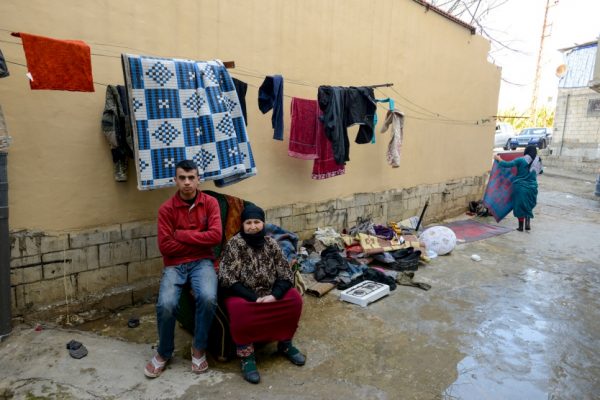
Syrian refugees in Lebanon are more vulnerable than ever, with more than half now living in extreme poverty and over three quarters living below the poverty line – according to the findings of a new survey by UNHCR, UNICEF and WFP. Seven years into the crisis, Syrian refugees in Lebanon are finding it even more difficult to make ends meet and are more reliant than ever on international aid – amid an uncertain outlook for humanitarian funding in 2018.
The annual Vulnerability Assessment of Syrian Refugees (VASyR) reveals that 58 per cent of households are now living in extreme poverty – on less than US$2.87 per person per day. This is some 5 per cent more than a year ago. And the number of households living below the overall poverty line – less than US$3.84 per day – has also continued to rise. 76 per cent of refugee households are living below this level.
This means over three quarters of Syrian refugees in Lebanon now live on less than US$4 per day, leaving refugees with dwindling resources to meet their most basic needs. Refugee households are now spending on average just US$98 per person per month – US$44 of which is spent on food.
Borrowing money for food, to cover health expenses and pay rent continues to be extremely common, with almost nine out of every 10 refugees saying they are in debt. This underlines the vulnerabilities facing most Syrian refugees in Lebanon.
Food insecurity also remains critically high – affecting 91 per cent of households to some degree. But vulnerabilities are also growing elsewhere. Obtaining legal residency continues to be a challenge, leaving refugees exposed to an increased risk of arrest, hindering their ability to register their marriages and making it more difficult for them to find daily labour, send their children to school or access health care.
Only 19 per cent of families reported that all members had legal residency, down from 21 per cent in 2016. More alarmingly, the share of households where no one has legal residency has increased considerably. Overall, 74 per cent of surveyed Syrian refugees aged 15 and above do not have legal residency in Lebanon.
The survey also revealed that only 17 per cent of refugee parents managed to complete all the steps of the birth registration process for their children – but higher percentages of families are at least completing the first two steps of the process – with nearly all families (96%) obtaining a notification of birth from the hospital or midwife, thanks to joint efforts by UNHCR and the Government.
Taken as a whole, the survey results paint an alarming picture of the growing vulnerabilities facing Syrian refugees in Lebanon. Seven years into the crisis, they are more reliant than ever on humanitarian aid – with more than two-thirds saying they had relied on some form of assistance in the previous three months. Self-reliance opportunities are extremely limited in an economy deeply affected by the neighbouring conflict in Syria. And external funding is insufficient to keep up with the growing needs; In 2017, only 36 per cent of the total funding needed to provide adequate humanitarian support in Lebanon was received, as of the beginning of December.
A further US$2.7 billion is needed to meet needs in 2018, under the Lebanon Crisis Response Plan. With upcoming conferences in Paris and Brussels aimed at mobilizing further support for the humanitarian response and for Lebanon in particular – it is more vital than ever that donors stay the course amid deepening poverty and growing vulnerabilities – which equally strain abilities to support vulnerable members of the local community who are also struggling with limited resources and help prevent social tensions between Lebanese hosts and refugees.
Background:
The VASyR survey is the fifth of its kind and involved researchers visiting some 5,000 refugee families randomly selected from 26 districts across Lebanon. It is key in shaping humanitarian aid programmes in Lebanon and revealing social and economic trends.
UNHCR

Leave a Reply
You must be logged in to post a comment.